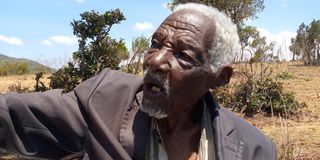Centenarian disappointed after failing to vote

Mzee Stephen Leriman speaking at his homestead in Kuri Kuri village, Laikipia North constituency on August 9, 2022. He explained why he failed to vote for the first time since independence. The centenarian is the oldest among four remaining elders who can fluently speak the Yakunte language, with other members of his Yaku ethnic group having adopted the Maasai language and culture.
Centenarian Stephen Leriman, from Laikipia North constituency, could not hide his disappointment after failing to cast his vote because he had misplaced his national identity card.
On the eve of election day, he kept his walking stick near his bed, woke up early on Tuesday and walked to Kuri Kuri Primary School, on the outskirts of Doldol town, only to realise that he did not have his identity card in his leather pouch.
“I have been waiting for this day and on Monday night, I saw vehicles bring voting materials to my polling station. I did not realise my identity card was missing until I was almost about to start the process of casting the ballot,” he told the Nation at the Yiaku museum.
“I had to come back to my boma, but I could not find it.”
Mzee Leriman is one of four remaining elders who can speak the threatened Yakunte language fluently. He said he had voted since Kenya gained independence and it felt bad failing to vote for the fifth Kenyan President. He suspected one of his sons may have carried it away by mistake.
“I obtained my identity card even before Kenya gained independence and have participated in all the previous elections. I do not blame anyone for failing to vote this year, because I know one cannot vote without this identification document,” said the elder, whose mind sounded sharp despite his advanced age.
Having failed to vote, he said, he had encouraged his children, grandchildren and great grandchildren to cast their votes for suitable candidates who would guarantee development and security in Laikipia and the rest of the country.
Mzee Leriman’s family voted at Kuri Kuri Primary School, a polling station with 148 voters. The station shares the same compound with the Sior mobile polling station, which has 25 voters, the third lowest number in Laikipia North constituency.
Sior, which was meant to serve migrating herders, was initially located in the Mukogodo forest but was moved to Kuri Kuri Primary because of insecurity after armed herders invaded the forest, one of the best community-managed areas in Kenya.
Constituency Returning Officer John Kahuro told the Nation that all the stations opened on time and the only challenge in the morning was that five Kiems gadgets malfunctioned but the problem was rectified by IEBC technicians.
Though no major challenges were reported in the constituency, turnout was low in areas occupied by pastoralists, with most polling centres failing to hit 50 percent turnout by 2pm.
Most polling clerks were idle most of the time as they waited for voters, while some places like Doldol Primary witnessed short queues for most of the day.
Locals attributed the low turnout to the prevailing drought, which they said had driven most herders to distant areas with their livestock in search of pasture and water.
“Compared to the 2017 General Election, the turnout is quite low owing to the current drought. Many of the voters are scattered with their livestock and I expect Laikipia North constituency will not attain more than 60 percent voter turnout,” said resident Solomon ole Pusi.
Laikipia North, with four wards, has 47,752 registered voters and seven parliamentary candidates, including the incumbent Sarah Korere, who is seeking to retain her seat under Jubilee.
Others include Ms Korere’s predecessor Mathew Lempurkel (ODM) and Maina Munene (UDA).





